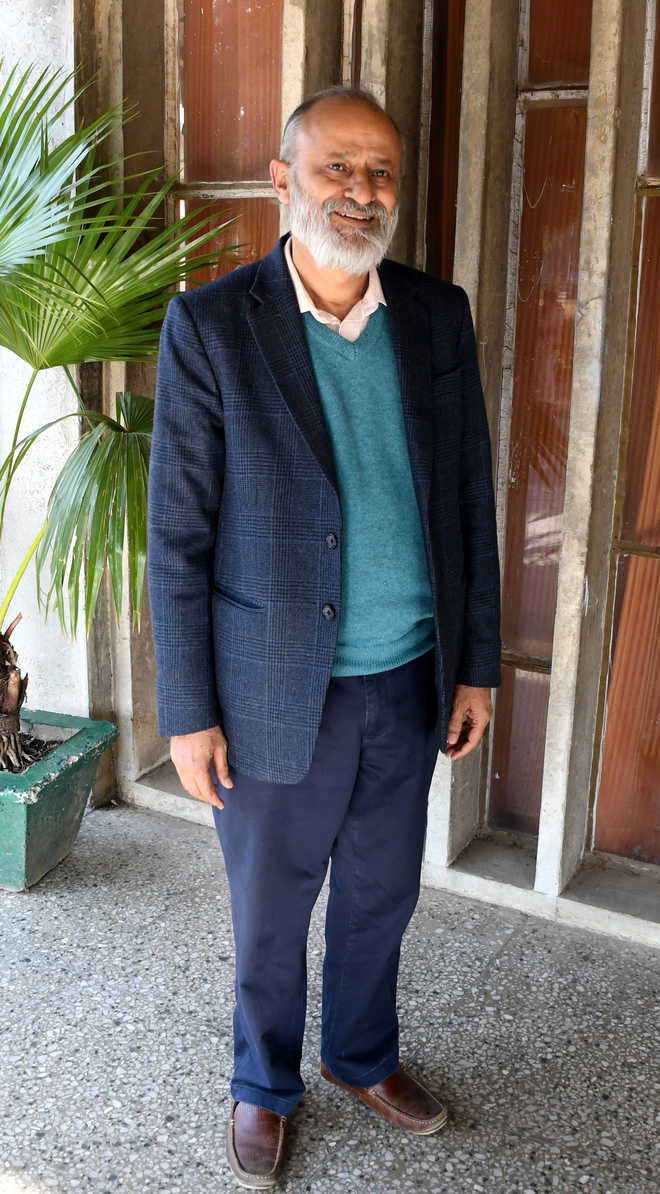
Gauhar Raza
Amarjot Kaur
Having witnessed the formative years of independent India, Urdu poet Gauhar Raza’s childhood was nurtured by first-hand stories about the freedom struggle. Visiting Panjab University, for the very first time, to screen his documentary on Bhagat Singh, Jallianwala Bagh is the first poem he recites. Titled Inqilab, the documentary recreates the massacre’s sepia-coloured imagery, giving it the same haunting quality as his poem.
A scientist at the National Institute of Science, Technology and Development Studies (NISTADS), Raza’s poetry is an unabashedly vocal expression of his concerns over India’s socio-political scenario. His ‘Muslim by birth, atheist by choice’ parents had fought for the country’s independence. “Our house harboured an interesting confluence of literature and science. My father, Wizarat Husain, was a freedom fighter, a communist party member, and a science teacher in Aligarh Muslim University, Uttar Pradesh,” he shares.
Back in time
With Inqilab, he weaves the frames of history together, showcasing rare documents, pictures, original footages, and newspaper clippings. “This is my homage to Bhagat Singh, who, as statistics in a national newspaper quoted, 94 per cent of North India’s youth consider an icon,” he says. In 2007, his friend, and the first student to have done a PhD on Bhagat Singh, Irfan Habib, was to deliver a talk on Singh at AIIMS. “He asked me if there was a documentary on Bhagat Singh. We found six Bollywood films on the freedom fighter, but not a single documentary.”
Fifteen days later, Raza met Irfan. “We got the data from National Archives of India and Nehru Memorial Museum and Library. Since HSRA was an underground organisation, most of its documents weren’t found, while others were banned by the British. We did, however, find the site plan of Saunders and Channan Singh murder case, made on a piece of cloth, which can be found nowhere else,” he adds. Inqilab was also co-produced by Nehru Memorial Museum and Library, and Act Now for Harmony and Democracy (ANHAD). “The original footages have been acquired from Pakistan,” he says.
Considering Bollywood made over six films on Bhagat Singh, Inqilab, says Raza, tells his story through facts. However, he confesses to having made the film with a certain bias. He shares, “I must have been in tenth standard; as an atheist, and in a bid to discover myself, I started studying closely the lives of revolutionaries, poets and scientists, and Bhagat Singh inspired me.”
Raza dismisses the rhetoric of ‘Gandhi versus Bhagat Singh’ debate as futile. Rather, he talks of Bhagat Singh as a symbol of resistance. “From bumper stickers on auto-rickshaws to reactionary organisations, everyone symbolises resistance with Bhagat Singh. He belongs to everyone, yet no one — that’s the beauty of Bhagat Singh,” he says. Raza also underlines the problem with misrepresentation of Bhagat Singh’s violence, especially when gangsters in Punjab eulogise the freedom fighter on their social-media accounts. “Bhagat Singh, like most revolutionaries, was of the belief that one should not attack only to retaliate an act of violence. However, Hindi cinema has eulogised this violence making it a dramatic part of Bhagat Singh’s character; that is a problem in projection and its appropriation by purely violent groups becomes easy, especially when they are illiterate,” he explains.
First take
Having made his first non-fiction documentary, titled In Dark Times, which was based on the German poet Bertolt Brecht, in mid 80s, Raza shares that his first non-fiction documentary was on nuclear disarmament. “It was titled Khoobsurat Jahaz. We made it on a VHS camera.” It took him a little more than six months to make the 40-minute long documentary on Bhagat Singh. “My only regret is that my father couldn’t watch the film. He died when I was still making it.”
Panjab University Professor Chaman Lal, who narrates parts of Singh’s life in the documentary, along with many others like Kamla Bhasin, Arpana Kaur, Sarah Hashmi, Zora Sehgal, Bipin Chandra and Prof KN Nayar, delivers a parting note from Bhagat Singh’s literary piece: Letter to Young Political Leader. “Bhagat Singh was not a nationalist,” he signs off.



























